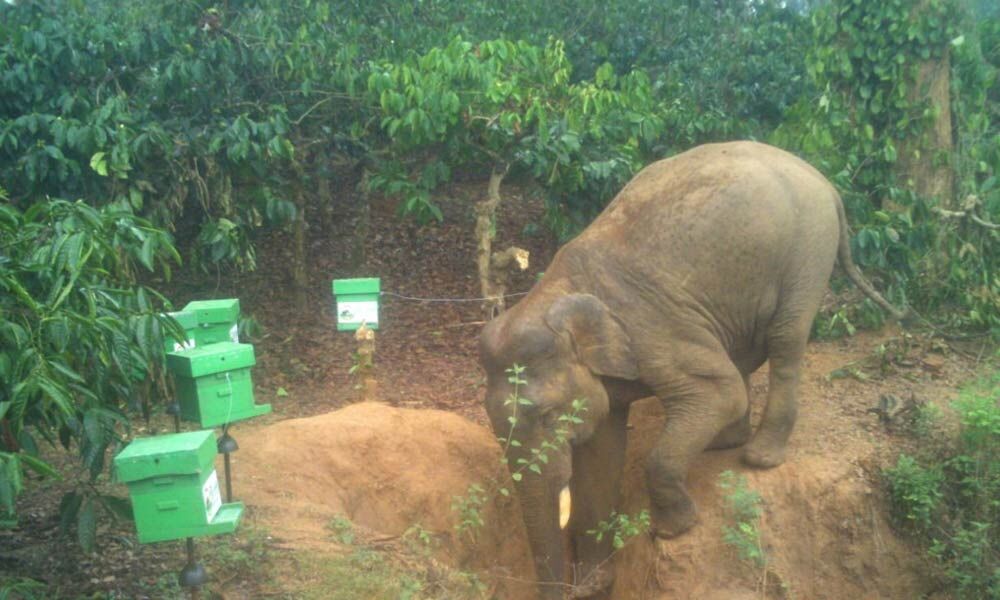Live
- BGT: We are seeing a master at work; I take my hat off to him, says Abbott on Bumrah
- Niranjan Reddy Slams Jupally Krishna Rao and Government Over Irrigation Incompetence
- Gardner reflects on Australia's dominant year after ODI series sweep over NZ
- Pushpa Producer Naveen Yerneni Donates Rs. 50 Lakhs to Family of Victim in Sandhya Theater Incident
- NC MP holds anti-reservation protest outside J&K CM’s residence
- Inflation burden eases for farm and rural labourers
- Delhi BJP releases 'chargesheet' against Kejriwal, AAP govt
- The First 40 Days: Sonnalli Seygall’s Thoughts on Traditional Postpartum Care
- CM Nitish Kumar embarks on Pragati Yatra from West Champaran, begins development drive in Bihar
- Rozgar Mela: Recruits from Patna, Panchkula express gratitude to PM Modi for appointment letters
Just In
Project RE-HAB proves effective in preventing elephant-human conflict in Kodagu


Project RE-HAB proves effective in preventing elephant-human conflict in Kodagu
Union Minister Nitin Gadkari hailed Khadi and Village Industries Commission's (KVIC) innovative Project RE-HAB, which has significantly reduced elephant's presence at four places in Karnataka's Kodagu district.
Bengaluru: Union Minister Nitin Gadkari hailed Khadi and Village Industries Commission's (KVIC) innovative Project RE-HAB, which has significantly reduced elephant's presence at four places in Karnataka's Kodagu district.
He said that the project has yielded encouraging results in preventing elephants' movement into human territories in Kodagu. Gadkari reposed faith in Project RE-HAB which he believes has huge potential and it will be soon replicated in all States affected by elephant attacks like West Bengal, Jharkhand, Odisha, Chhattisgarh, Assam, Tamil Nadu and Kerala. He also emphasized the need for participation of Ministries of Agriculture and Environment and Forest for effective implementation of the project across the country.
Project RE-HAB (Reducing Elephant – Human Attacks using Bees) was launched by KVIC Chairman Vinai Kumar Saxena last month, at four locations on the periphery of Nagarhole National Park in Kodagu district of Karnataka. It is a unique, cost-effective way of preventing elephant-human conflicts without causing any harm to the animals and the humans. Under this project, bee boxes are used as a fence to prevent elephants from entering human habitation and thus reducing loss of lives and properties. Elephants fear being stung by honey bees in their eyes and the inner side of the trunk. Also, the buzz of the bees irritates the elephants the most.
Saxena stated that elephants avoid returning to the place where they have encountered honey bees and this would dissuade them without causing any harm.
Bee fences have reduced the movement of elephants at these points to a great extent, which has come as a big relief for the local farmers. Night vision cameras installed at these locations have not only shown a sharp decline in the movement of elephants in human territories but also captured amazing footages of elephants' behaviour on seeing bee boxes. A number of elephants are seen returning to the jungles fearing honey bees. Also, no destruction of crops or properties by elephants has been reported in these areas since the bee boxes have been placed on the passageways of elephants.
KVIC Chairman Saxena said implementing Project RE-HAB in other States will save hundreds of human and elephant lives. "KVIC is set to replicate the project in other States too, where a large tribal and rural population is living under the constant threat of wild elephants. Project RE-HAB will have multi-pronged benefits. This will reduce human-elephant conflicts, increase farmers' income through beekeeping, address climate change, regenerate forest cover and ensure food security for wild animals in their natural habitats," he said.
States like West Bengal, Jharkhand, Odisha, Chhattisgarh, Assam, Tamil Nadu and Kerala are major elephant – human conflict zones where KVIC is planning to implement Project RE-HAB in a phased manner. Approximately 2,400 people have been killed in conflicts with wild elephants across the country since 2015.
"Through this project, the locals residing in these areas will be trained in beekeeping and will be provided bee boxes which will be used to ward off wild elephants. Honey produced from these boxes will increase their income and, at the same time, honey bees will prevent elephants from entering into their areas," Saxena said. "Earlier State governments have taken several measures like digging up trenches, erecting rail fencing and spiked pillars and putting up electric fences and electric wire curtains to keep elephants away from human territories. Not only have all these efforts failed but also ended up killing more elephants in the most tragic ways," he added.
The Central Bee Research and Training Institute, Pune, which is a unit of KVIC, had earlier conducted field trials of creating "bee-fences" in Maharashtra to mitigate elephant attacks.

© 2024 Hyderabad Media House Limited/The Hans India. All rights reserved. Powered by hocalwire.com






